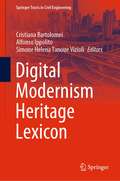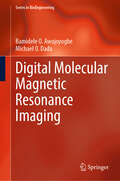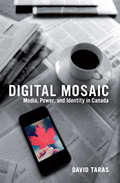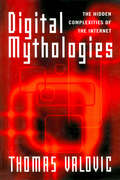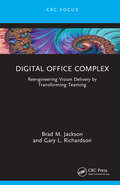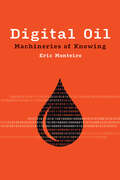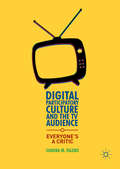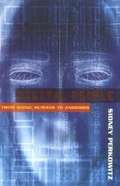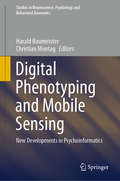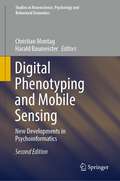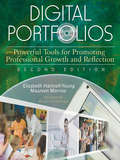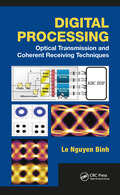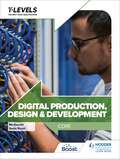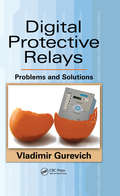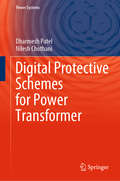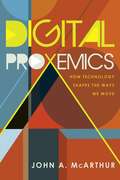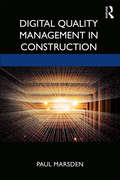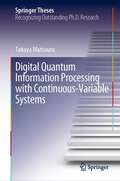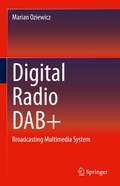- Table View
- List View
Digital Modernism Heritage Lexicon (Springer Tracts in Civil Engineering)
by Cristiana Bartolomei Alfonso Ippolito Simone Helena Tanoue VizioliThe book investigates the theme of Modernism (1920-1960 and its epigones) as an integral part of tangible and intangible cultural heritage which contains the result of a whole range of disciplines whose aim is to identify, document and preserve the memory of the past and the value of the future. Including several chapters, it contains research results relating to cultural heritage, more specifically Modernism, and current digital technologies. This makes it possible to record and evaluate the changes that both undergo: the first one, from a material point of view, the second one from the research point of view, which integrates the traditional approach with an innovative one. The purpose of the publication is to show the most recent studies on the modernist lexicon 100 years after its birth, moving through different fields of cultural heritage: from different forms of art to architecture, from design to engineering, from literature to history, representation and restoration. The book appeals to scholars and professionals who are involved in the process of understanding, reading and comprehension the transformation that the places have undergone within the period under examination. It will certainly foster the international exchange of knowledge that characterized Modernism
Digital Molecular Magnetic Resonance Imaging (Series in BioEngineering)
by Michael O. Dada Bamidele O. AwojoyogbeThis book pushes the limits of conventional MRI visualization methods by completely changing the medical imaging landscape and leads to innovations that will help patients and healthcare providers alike. It enhances the capabilities of MRI anatomical visualization to a level that has never before been possible for researchers and clinicians. The computational and digital algorithms developed can enable a more thorough understanding of the intricate structures found within the human body, surpassing the constraints of traditional 2D methods. The Physics-informed Neural Networks as presented can enhance three-dimensional rendering for deeper understanding of the spatial relationships and subtle abnormalities of anatomical features and sets the stage for upcoming advancements that could impact a wider range of digital heath modalities. This book opens the door to ultra-powerful digital molecular MRI powered by quantum computing that can perform calculations that would take supercomputers millions of years.
Digital Mosaic: Media, Power, And Identity In Canada
by David TarasDigital Media has transformed the way Canadians socialize and interact, conduct business, experience culture, fight political battles, and acquire knowledge. Traditional media, including newspapers and conventional TV networks, remain the primary link to Canada's political sphere but are under concerted attack. YouTube, blogs, online broadcasting, Facebook, and Twitter have opened new and exciting avenues of expression but offer little of the same "nation-building glue" as traditional media. Consequently, Canada is experiencing a number of overlapping crises simultaneously: a crisis in news and journalism, threats to the survival of the media system as a whole, and a decline in citizen engagement. In Digital Mosaic, David Taras both embraces and challenges new media by arguing that these coinciding crises bring exciting opportunities as well as considerable dangers to democratic life and citizen engagement in Canada.
Digital Mythologies: The Hidden Complexities of the Internet
by Thomas ValovicSurf the web. Ride the information highway. Log on to the future. Corporate ad campaigns like these have become pervasive in the 1990s. You're either online, or you're falling behind the times-at least, that's what the media tells us. Ever since the 1990s, when the Internet gained widespread popularity, it has been heralded as one of the best things ever to happen to technology and communications. Commentators expected it to revolutionize how we communicate, do business, and educate our children. Conversely, other pundits have vehemently attacked this technology. Naysayers of "cyberlife" emerged with their warnings of how the Net provides an uncensored, round-the-clock venue for pornography, for inaccurate, simplified information, and is rife with opportunities to violate our right to privacy. In Digital Mythologies, Thomas Valovic hopes to raise the level of discussion by giving a full and balanced picture of how the Net affects our lives. Digital Mythologies, a collection of Valovic's essays, asks hard questions about where computer and communications technology is taking us. Through anecdotes drawn from his experiences as former editor-in-chief of Telecommunications magazine, the author gives readers an insider's peek behind the scenes of the Internet industry. He explores the underlying social and political implications of the Internet and its associated technologies, based on his contention that the cyberspace experience is far more complex than is commonly assumed. Valovic explores these hidden complexities, and points to fascinating connections between the Internet and our contemporary culture.
Digital Office Complex: Reengineering Vision Delivery by Transforming Teaming
by Gary L. Richardson Brad M. JacksonWith ever-increasing competitive pressures, the need to reduce the time-to-value (or time-to-bail) of a “big idea” – a new product, an organizational transformation, a healthcare initiative, or a humanitarian development project – has never been greater. Unfortunately, the current digital infrastructure for vision delivery teams is woefully inadequate. Improvement opportunities lie in replacing it with one that is designed to support teams working together in a unifying manner. The focus of this book is describing the Digital Office Complex and the accompanying digital teaming and governing capabilities needed to reengineer vision delivery.Digital Office Complex: Reengineering Vision Delivery by Transforming Teaming offers an in-depth understanding of the elements of “digital teaming and governing” and how they can be applied to vision delivery to accelerate and improve performance. The book identifies and describes the requirements for an integrated infrastructure to support: team goal management, teamwork coordination, team decision support, team “work product” support, and approval workflow capabilities in addition to “team-to-team” navigation, “team-to-team” coordination, and “team-to-team” data exchange. The aim for this book is to describe and illustrate “digital teaming and governing” practices using the Digital Office Complex to improve performance. The book goes on to a team-centric delivery method for initiatives and artificial intelligence capabilities to augment teamwork. The book concludes with critical success factors for implementation and an approach for reengineering vision delivery.Written for people who desire to implement the next level of high-performance teaming to improve organizational performance, this book is an ideal read for management consultants, executives, strategy managers, project managers, HR managers, team leaders, team members, and students in business and engineering programs.
Digital Oil: Machineries of Knowing (Infrastructures)
by Eric MonteiroHow is digitalization of the offshore oil industry fundamentally changing how we understand work and ways of knowing?Digitalization sits at the forefront of public and academic conversation today, calling into question how we work and how we know. In Digital Oil, Eric Monteiro uses the Norwegian offshore oil and gas industry as a lens to investigate the effects of digitalization on embodied labor, and in doing so shows how our use of new digital technology transforms work and knowing. For years, roughnecks have performed the dangerous and unwieldy work of extracting the oil that lies three miles below the seabed along the Norwegian Continental Shelf. Today, the Norwegian oil industry is largely digital, operated by sensors and driven by data. Digital representations of physical processes inform work practices and decision-making with remotely operated, unmanned deep-sea facilities. Drawing on two decades of in-depth interviews, observations, news clips, and studies of this industry, Eric Monteiro dismantles the divide between the virtual and the physical in Digital Oil. What is gained or lost when objects and processes become algorithmic phenomena with the digital inferred from the physical? How can data-driven work practices and operational decision-making approximate qualitative interpretation, professional judgement, and evaluation? How are emergent digital platforms and infrastructures, as machineries of knowing, enabling digitalization? In answering these questions Monteiro offers a novel analysis of digitalization as an effort to press the limits of quantification of the qualitative.
Digital Participatory Culture and the TV Audience
by Sandra M. FaleroIn this study, Falero explores how online communities of participatory audiences have helped to re-define authorship and audience in the digital age. Using over a decade of ethnographic research, Digital Participatory Culture and the TV Audience explores the rise and fall of a site that some heralded as ground zero for the democratization of television criticism. Television Without Pity was a web community devoted to criticizing television programs. Their mission was to hold television networks and writers accountable by critiquing their work and "not just passively sitting around watching. " When executive producer Aaron Sorkin entered Television Without Pity's message boards on The West Wing in late 2001, he was surprised to find the discussion populated by critics rather than fans. His anger over the criticism he found there wound up becoming a storyline in a subsequent episode of The West Wing wherein web critics were described as "obese shut-ins who lounge around in muumuus and chain-smoke Parliaments. " This book examines the culture at Television Without Pity and will appeal to students and researchers interested in audiences, digital culture and television studies.
Digital People: From Bionic Humans To Androids
by Sidney PerkowitzRobots, androids, and bionic people pervade popular culture, from classics like Frankenstein and R.U.R. to modern tales such as The Six Million Dollar Man, The Terminator, and A.I. Our fascination is obvious – and the technology is quickly moving from books and films to real life. In a lab at MIT, scientists and technicians have created an artificial being named COG. To watch COG interact with the environment – to recognize that this machine has actual body language – is to experience a hair-raising, gut-level reaction. Because just as we connect to artificial people in fiction, the merest hint of human-like action or appearance invariably engages us. Digital People examines the ways in which technology is inexorably driving us to a new and different level of humanity. As scientists draw on nanotechnology, molecular biology, artificial intelligence, and materials science, they are learning how to create beings that move, think, and look like people. Others are routinely using sophisticated surgical techniques to implant computer chips and drug-dispensing devices into our bodies, designing fully functional man-made body parts, and linking human brains with computers to make people healthier, smarter, and stronger. In short, we are going beyond what was once only science fiction to create bionic people with fully integrated artificial components – and it will not be long before we reach the ultimate goal of constructing a completely synthetic human-like being. It seems quintessentially human to look beyond our natural limitations. Science has long been the lens through which we squint to discern our future. Although we are rightfully fearful about manipulating the boundaries between animate and inanimate, the benefits are too great to ignore. This thoughtful and provocative book shows us just where technology is taking us, in directions both wonderful and terrible, to ponder what it means to be human.
Digital Personality: Volume 3: Ontologies to Dialogue Generation
by Anand Nayyar Jagjit Singh Dhatterwal Kuldeep Singh KaswanThe book explores the creation of digital personalities that mimic human behaviour and cognition, authored by AI and computer science experts. It covers the technical foundations needed to develop advanced digital personas, focusing on the integration of ontologies, natural language processing (NLP), and dialogue generation. Ontologies are highlighted for their role in structuring knowledge, while NLP techniques are explored for enabling human-like dialogue. The book examines algorithms for sentiment analysis, entity recognition, and context understanding. Dialogue generation is also discussed, from rule-based methods to deep learning, emphasizing seamless user interactions. Ethical concerns, such as privacy, bias, and accountability, are addressed, advocating for responsible AI practices. This volume is a comprehensive resource for researchers and enthusiasts, offering both theoretical insights and practical guidance on building lifelike digital entities and fostering emotionally engaging human-computer interactions.
Digital Phenotyping and Mobile Sensing: New Developments in Psychoinformatics (Studies in Neuroscience, Psychology and Behavioral Economics)
by Christian Montag Harald BaumeisterThis book offers a snapshot of cutting-edge applications of mobile sensing for digital phenotyping in the field of Psychoinformatics. The respective chapters, written by authoritative researchers, cover various aspects related to the use of these technologies in health, education, and cognitive science research. They share insights both into established applications of mobile sensing (such as predicting personality or mental and behavioral health on the basis of smartphone usage patterns) and emerging trends. Machine learning and deep learning approaches are discussed, and important considerations regarding privacy risks and ethical issues are assessed. In addition to essential background information on various technologies and theoretical methods, the book also presents relevant case studies and good scientific practices, thus addressing researchers and professionals alike. To cite Thomas R. Insel, who wrote the foreword to this book: “Patients will only use digital phenotyping if it solves a problem, perhaps a digital smoke alarm that can prevent a crisis. Providers will only use digital phenotyping if it fits seamlessly into their crowded workflow. If we can earn public trust, there is every reason to be excited about this new field. Suddenly, studying human behavior at scale, over months and years, is feasible.”
Digital Phenotyping and Mobile Sensing: New Developments in Psychoinformatics (Studies in Neuroscience, Psychology and Behavioral Economics)
by Christian Montag Harald BaumeisterThis book offers a snapshot of cutting-edge applications of digital phenotyping and mobile sensing for studying human behavior and planning innovative e-healthcare interventions. The respective chapters, written by authoritative researchers, cover both theoretical perspectives and good scientific and professional practices related to the use and development of these technologies. They share novel insights into established applications of mobile sensing, such as predicting personality or mental and behavioral health on the basis of smartphone usage patterns, and highlight emerging trends, such as the use of machine learning, big data and deep learning approaches, and the combination of mobile sensing with AI and expert systems. Important issues relating to privacy and ethics are analyzed, together with selected case studies. This thoroughly revised and extended second edition provides researchers and professionals with extensive information on the latest developments in the field of digital phenotyping and mobile sensing. It gives a special emphasis to trends in diagnostics systems and AI applications, suggesting important future directions for research in public health and social sciences.
Digital Photogrammetry
by Yves Egels Michel KasserPhotogrammetry is the use of photography for surveying primarily and is used for the production of maps from aerial photographs. Along with remote sensing, it represents the primary means of generating data for Geographic Information Systems (GIS). As technology develops, it is becoming easier to gain access to it. The cost of digital photogrammetr
Digital Photography For The Over 50s: Teach Yourself
by Peter CopeDo you want to get to grips with your camera? Do you want to take some great photos and make them even better using your computer?Do you want to learn how to create great photo albums, share photos on the internet, even create slideshows to share with family and friends?Teach Yourself Photography for the Over 50s shows you how to choose a digital camera, become familiar with its functions and use it to produce some memorable photos. The book uses clear instructions, useful hints and tips and illustrations to show you all the essential techniques. Avoiding jargon and computerspeak, it also shows you how to use your computer with your camera and explores opportunities for producing great photos without a computer.NOT GOT MUCH TIME?One, five and ten-minute introductions to key principles to get you started.AUTHOR INSIGHTSLots of instant help with common problems and quick tips for success, based on the author's many years of experience.TEST YOURSELFTests in the book and online to keep track of your progress.EXTEND YOUR KNOWLEDGEExtra online articles at www.teachyourself.com to give you a richer understanding of digital photography.FIVE THINGS TO REMEMBERQuick refreshers to help you remember the key facts.TRY THISInnovative exercises illustrate what you've learnt and how to use it.
Digital Photography For The Over 50s: Teach Yourself (Teach Yourself Computing Ser.)
by Peter CopeDo you want to get to grips with your camera? Do you want to take some great photos and make them even better using your computer?Do you want to learn how to create great photo albums, share photos on the internet, even create slideshows to share with family and friends?Teach Yourself Photography for the Over 50s shows you how to choose a digital camera, become familiar with its functions and use it to produce some memorable photos. The book uses clear instructions, useful hints and tips and illustrations to show you all the essential techniques. Avoiding jargon and computerspeak, it also shows you how to use your computer with your camera and explores opportunities for producing great photos without a computer.NOT GOT MUCH TIME?One, five and ten-minute introductions to key principles to get you started.AUTHOR INSIGHTSLots of instant help with common problems and quick tips for success, based on the author's many years of experience.TEST YOURSELFTests in the book and online to keep track of your progress.EXTEND YOUR KNOWLEDGEExtra online articles at www.teachyourself.com to give you a richer understanding of digital photography.FIVE THINGS TO REMEMBERQuick refreshers to help you remember the key facts.TRY THISInnovative exercises illustrate what you've learnt and how to use it.
Digital Photography Masterclass
by Tom AngIn this book, the author gives readers a personal guide on how to go about mastering the art of digital photography. He tells readers and budding digital photographers that visualizing the result you desire is key to taking a good photo. <p><p> The book covers how to use complex software and equipment to your best advantage, by learning the intricacies of timing, lighting, and composition. The book allows you to manipulate the images you take, with detailed tutorials on post-production. <p><p> One it teaches you the fundamentals of these aspects, you can use this book to focus on your interests, as the author has provided tips for varying types of photography. From how to take portraits effectively to shooting sports photos, the book is a comprehensive source of information about digital photography. <p><p> He has also provided guided projects with instructional steps, practical assignments, inspiring examples of photography, and succinct tutorials to give readers the best of digital photography.
Digital Portfolios: Powerful Tools for Promoting Professional Growth and Reflection (2nd Edition)
by Elizabeth Hartnell-Young Maureen P. MorrissProviding ten steps to develop portfolios that demonstrate professional growth, this complete resource presents tips and strategies for using digital technology and guidelines for creating portfolios.
Digital Processing: Optical Transmission and Coherent Receiving Techniques (Optics and Photonics)
by Le Nguyen BinhWith coherent mixing in the optical domain and processing in the digital domain, advanced receiving techniques employing ultra-high speed sampling rates have progressed tremendously over the last few years. These advances have brought coherent reception systems for lightwave-carried information to the next stage, resulting in ultra-high capacity global internetworking. Digital Processing: Optical Transmission and Coherent Receiving Techniques describes modern coherent receiving techniques for optical transmission and aspects of modern digital optical communications in the most basic lines. The book includes simplified descriptions of modulation techniques for such digital transmission systems carried by light waves. It discusses the basic aspects of modern digital optical communications in the most basic lines. In addition, the book covers digital processing techniques and basic algorithms to compensate for impairments and carrier recovery, as well as noise models, analysis, and transmission system performance.
Digital Production, Design and Development T Level: Core
by Sonia Stuart Maureen EverettTackle the core component of the Digital Production, Design and Development T Level with this comprehensive resource.Written by highly respected authors, Mo Everett and Sonia Stuart, this clear, accessible and thorough textbook will guide learners through the key principles, concepts and terminology, as well as providing the inside track into what it takes to kick-start a career in the Digital world.- Simplify complex topics with summary tables, diagrams, key term definitions and a glossary.- Track and strengthen knowledge by using learning outcomes at the beginning of every unit and 'Test Yourself' questions.- Apply knowledge and understanding across 100s of engaging activities and research tasks.- Prepare for exams and the employer-set project using practice questions and project practice exercises.- Get ready for the workplace with industry tips and real-world examples.- Be guided through the course by expert authors Mo Everett and Sonia Stuart, who draw on their extensive industry and teaching experience.
Digital Production, Design and Development T Level: Core
by Sonia Stuart Maureen EverettTackle the core component of the Digital Production, Design and Development T Level with this comprehensive resource.Written by highly respected authors, Mo Everett and Sonia Stuart, this clear, accessible and thorough textbook will guide learners through the key principles, concepts and terminology, as well as providing the inside track into what it takes to kick-start a career in the Digital world.- Simplify complex topics with summary tables, diagrams, key term definitions and a glossary.- Track and strengthen knowledge by using learning outcomes at the beginning of every unit and 'Test Yourself' questions.- Apply knowledge and understanding across 100s of engaging activities and research tasks.- Prepare for exams and the employer-set project using practice questions and project practice exercises.- Get ready for the workplace with industry tips and real-world examples.- Be guided through the course by expert authors Mo Everett and Sonia Stuart, who draw on their extensive industry and teaching experience.
Digital Protective Relays: Problems and Solutions
by Vladimir GurevichDigital (microprocessor-based) protection relays (DPR) are dominating the global market today, essentially pushing all other types of relays out of the picture. These devices play a vital role in power operations for fields ranging from manufacturing, transportation, and communication to banking and healthcare.Digital Protective Relays: Problems and Solutions offers a unique focus on the problems and disadvantages associated with their use, a crucial aspect that goes largely unexamined. While there is already a massive amount of literature documenting the benefits of using digital relays, devices as sophisticated as DPR obviously have faults and drawbacks that need to be understood. This book covers these, delving into the less familiar inner workings of DPR to fill a critical literary void and help decision makers and specialists in the field of protection relays find their way out of the informational vacuum. The book provides vital information to assist them in evaluating relay producers' claims and then choose the right product. Tearing away the informational "curtain" that exists today, this book:Describes construction of functional modules of existing relaysAnalyzes drawbacks and problems of digital relaysDetails specific technical problems and their solutionsAssesses dangers of intentional destructive electromagnetic intrusionsDiscusses alternative (non-microprocessor-based) protection relays, and problems related to international standardsFocusing on practical solutions, this book explains how to correctly choose digital relays and ensure their proper use while avoiding the many problems they can present. The author avoids mathematics and theory in favor of more practical, tangible information not easily found elsewhere. Setting itself apart from other books on the subject, this volume shines a light into the long hidden "black box" of information
Digital Protective Schemes for Power Transformer (Power Systems)
by Dharmesh Patel Nilesh ChothaniThis book provides a comprehensive overview of protection schemes used for power transformers and describes the internal fault conditions and external abnormalities that may disrupt the operation of a power transformer. It also highlights the issues of current protective schemes, which pose several challenges in terms of the detection of internal faults and abnormalities, including computational burden, reduced accuracy, difficulty to implement, increased cost, computational complexity, impermeability to high resistance faults (HRF), and malfunction in conditions like cross-country fault. To address these problems, the book develops an effective novel transformer protection scheme that can eliminate all the said difficulties using an innovative algorithm. Given its scope, it is a useful resource for researchers and practitioners working in the field of power system protection, allowing them to design novel protection schemes, and providing insights into the hardware validation of developed technique.
Digital Proxemics: How Technology Shapes The Ways We Move (Digital Formations #110)
by John McArthurThe study of proxemics - the human use of space - is reimagined for the digital age in this book, a compelling examination of the future of the ways we move. Whereas much writing on the subject focuses on what digital technology might do for us, this book explores what the same technology might do to us. <p><p> Combining dynamic stories, cutting-edge research, and deep reflection on the role of space in our lives, Digital Proxemics examines the ways that our uses of physical and digital spaces and our uses of technology are converging. It investigates the role of digital communication in proxemics, offering explorations of the ways digital technology shapes our personal bodily movement, our interpersonal negotiation of social space, and our navigation of public spaces and places. Through the lens of information and user-experience design, it adds forbidden spaces, ubicomp, augmented reality, digital surveillance, and virtual reality to the growing lexicon surrounding proxemics. The result is a spatial turn in the study of digital technology and a digital turn in the study of proxemics. <p> As our culture changes, our ability to make choices about how to move will be called into question, as will our expectations for what roles technology will play in our lives. As we navigate this intersection, Digital Proxemics is at once a valuable lens through which we can view our shifting culture, a cautionary tale through which we might envision problematic outcomes, and an optimistic projection of possibility for the future of human communication and technology interaction.
Digital Quality Management in Construction
by Paul MarsdenMuch has been written about Building Information Modelling (BIM) driving collaboration and innovation, but how will future quality managers and engineers develop digital capabilities in augmented and video realities, with business intelligence platforms, robots, new materials, artificial intelligence, blockchains, drones, laser scanning, data trusts, 3D printing and many other types of technological advances in construction? These emerging technologies are potential game changers that require new skills and processes. Digital Quality Management in Construction is the first ‘how to’ book on harnessing novel disruptive technology in construction quality management. The book takes a tour of the new technologies and relates them to the management of quality, but also sets out a road map to build on proven lean construction techniques and embed technologically based processes to raise quality professionals’ digital capabilities. With the mountain of data being generated, quality managers need to unlock its value to drive the quality of construction in the twenty-first century, and this book will help them do that and allow those working in construction Quality Management to survive and thrive, creating higher quality levels and less waste. This book is essential reading for quality managers, project managers and all professionals in the Architecture, Engineering and Construction industry (AEC). Students interested in new and disruptive technologies will also learn a great deal from reading this book, written by a professional quality manager with nearly thirty years’ experience in both the public and private sectors.
Digital Quantum Information Processing with Continuous-Variable Systems (Springer Theses)
by Takaya MatsuuraThe book provides theoretical methods of connecting discrete-variable quantum information processing to continuous-variable one. It covers the two major fields of quantum information processing, quantum communication and quantum computation, leading to achievement of a long-sought full security of continuous-variable quantum key distribution (QKD) and proposal of a resource-efficient method for optical quantum computing. Firstly, the book provides a security of continuous-variable QKD against arbitrary attacks under a realistic condition such as finite communication rounds and the use of digitized information processing. The book also provides the unified view for conventionally used approximate Gottesman-Kitaev-Preskill (GKP) codes, which encodes qudits on a continuous-variable system, enabling direct comparison between researches based on different approximations. The book finally proposes a resource-efficient method to realize the universal optical quantum computation using the GKP code via the direct preparation of the GKP magic state instead of GKP Pauli states. Feasibility of the proposed protocol is discussed based on the existing experimental proposals for the GKP state preparation.
Digital Radio DAB+: Broadcasting Multimedia System
by Marian OziewiczThis book describes the basic functions of the European Digital Radio DAB+ (Digital Audio Broadcasting plus) with its direct possible applications in a simple way. The book refers to fundamentals of DABs 80+ norms and specifications. Presented subjects are indicating problems of DAB signal propagation and possible multimedia applications. The book provides about 130 figures for explaining new concepts in an easy to approach manner. Applications include, but are not limited to audio compression MPEG, OFDM, SFN phasor representation, multiplexes, MOT, and conditional access. The book is intended for those interested in decisions regarding radio at various levels, owners of radio stations, and designers of various multimedia applications of digital radio in the field of security, students of wireless systems, etc. • Presents the fundamental functions of DAB / DAB+ (Digital Audio Broadcasting) along with its applications• Outlines the European Digital Radio system• Explains the functions of worldwide emerging digital radio subsystems
